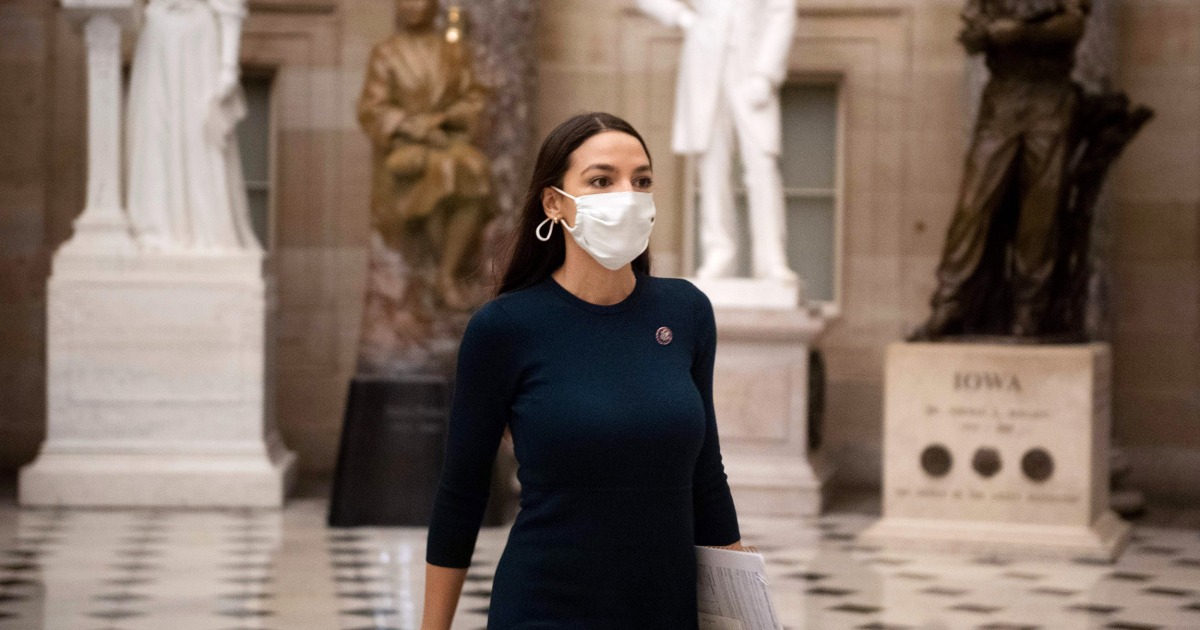
Rep. Alexandria Ocasio-Cortez, D-N.Y., said she still thinks about the “extraordinarily traumatizing event” that took place at the Capitol four months ago, when hundreds of rioters stormed into the building and came dangerously close to then-Vice President Mike Pence.
“Pence was taken out of the Senate chamber something like 60 seconds before these terrorists, insurrectionists got into the Senate chamber,” Ocasio-Cortez said in a conversation with the journalist Maria Hinojosa, airing Friday on the weekly public radio show "Latino USA" and shared in advance with NBC News.
“Pence was the one person, arguably, that had one of the most important roles in making sure that procedurally the Electoral College counts went on as proceeded. Sixty seconds could have meant potentially the difference between what we have right now and a martial state,” Ocasio-Cortez said. “This was an all-out attempted coup.”
“If 60 seconds went differently, if a different door was opened, if a chair wasn't barricaded in a certain way, we could have a completely different reality right now," she said. “We don't want to acknowledge that that's how close we got, but that is how close we got."
Ocasio-Cortez talked about her experience after the Capitol attack as well as her role as a young, influential Latina navigating American politics.
In Ocasio-Cortez’s view, many people refuse to admit how the attack’s aftermath “has impacted the actual legislative process” in Congress.
A probe conducted in the wake of the Jan. 6 Capitol riot found that threats against members of the most racially and ethnically diverse Congress in history have more than doubled this year, according to the U.S. Capitol Police.
“It has deeply, deeply affected lawmaking, policy making,” she told Hinojosa, “and it's very quiet, it's not spoken about.”
Already evident partisan tensions between Democrats and Republicans became even more apparent on Wednesday when the House voted to create an independent commission to investigate the Jan. 6 attack, largely along party lines.
Prior to the House vote, Senate Minority Leader Mitch McConnell, R-Ky., said he opposed the creation of the commission, calling it a “slanted and unbalanced” effort from House Democrats. At least 10 Republicans are needed in the Senate to pass the legislation.
Ocasio-Cortez recalled how rioters and other pro-Trump protesters built “functional gallows with nooses and they put them in front of the Capitol.”
“They were looking for us, and we were not protected,” she said. “White supremacy in and of itself is a mythology, and you have to protect it in order to protect that political power, which has now become a very important base in the Republican Party.”
For Ocasio-Cortez, the white supremacist ideals are interconnected with the “idea of American exceptionalism.”
“There's this one myth that it's all happened because we're smarter and perform better," she said. "I don't think we've really internalized how much of that has been created through the subjugation of other people."
From the Puerto Rican neighbor who helps Ocasio-Cortez feel more connected to her Puerto Rican heritage by telling her stories about resistance movements in the U.S. territory, to finding new ways to understand her connection to the “collective identity” that defines Latinos, Ocasio-Cortez said it's important for Latino political leaders “to know who we are.”
“You can elect a Latino who doesn't know who they are. And they advance really problematic policies, and it happens all the time. In fact, it's one of the big reasons why I ran for office,” Ocasio-Cortez, who is from the Bronx, said. “We had a lot of Latinos and Black and brown elected officials, and they advanced the causes of corporate interests.”
“That's why it's important for us to understand what's real, because any corporation can hire a Latino lobbyist and then have it seem woke,” she said.
Follow NBC Latino on Facebook, Twitter and Instagram.
Comments
Post a Comment